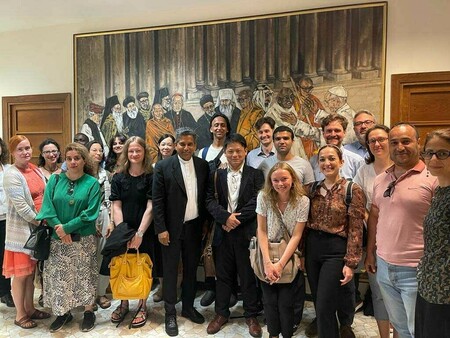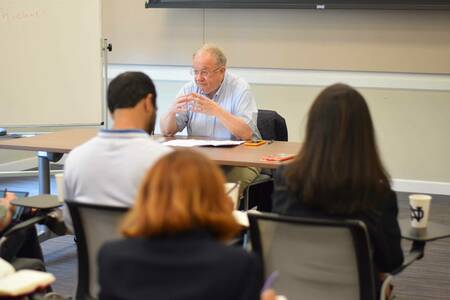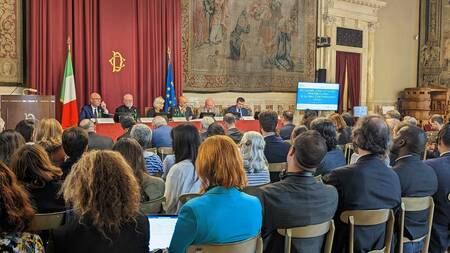Rome Global Gateway launches Rome Summer Seminars on Religion and Global Politics

In June, the University of Notre Dame’s Rome Global Gateway co-hosted the first edition of the Rome Summer Seminars on Religion and Global Politics. The two-week program welcomed 17 graduate students and postdoctoral fellows working at the intersection of religious studies and international affairs for a full schedule of writing workshops, graduate seminars and public events. The program included visits to the many sites that have made Rome a key hub for transnational and multi-religious policymaking, including the Great Mosque and Great Synagogue of Rome, the Vatican’s Dicastery for Interreligious Dialogue, the Community of Sant’Egidio and the U.S. Embassy to the Holy See.
“The idea of the Summer Seminars was to recognize the importance that Rome as a site for religious political activity has taken over the last 20 years,” Michael Driessen, director of the program, said. “Rome’s transnational nature has turned it into a central hub for religious political activity with many different resources, an incredible network of people, ideas and institutions at the intersection of religion and politics, and our hope was to take advantage of those resources, share them with the students and connect scholars and students who are working on similar projects.”
“Rome is a city of great history and very impressive architecture,” added Mahan Mirza, executive director of the Rafat and Zoreen Ansari Institute for Global Engagement with Religion in the Keough School of Global Affairs at Notre Dame. “Just being in this city gives you a real gravitas of both tradition and a central place of religion in the life of communities and of the world; coming to Rome inspires students to think about the role of religion in global politics.”

The students in the program represented 15 different nationalities, including Georgia, the Gambia, Iran, Taiwan, Lebanon, Algeria, Romania, the U.K., India and Pakistan, and hailed from a diverse array of universities such as Stanford, McGill, Göttingen, Notre Dame, Bouira and St. Andrews. Leading scholars in the field, such as Olivier Roy of the European University Institute, Kristina Stoeckl of LUISS, Jonathan Laurence of Boston College, Anna Rowlands of Durham University and Scott Appleby, the Marilyn Keough Dean of the Keough School of Global Affairs, provided lectures and seminars for the students. Public events were held at the Pontifical Gregorian University and John Cabot University, as well as at the Rome Global Gateway.
Rowlands said: “I think we are currently living in a moment, in terms of the academy and the world, where there is a deep need for interdisciplinary conversations about the role of religion and global politics. The Rome Summer Seminars in Religion and Global Politics has therefore been a fantastic opportunity to work with a group of junior and senior scholars together, covering a really wide and appropriately global context.”
The University of Notre Dame’s Keough School of Global Affairs and Rome Global Gateway were founding partners of the program, along with the Pontifical Gregorian University, John Cabot University in Rome, the Hanns Seidel Stiftung of Germany, the Adyan Foundation of Lebanon and the Royal Institute for Inter-Faith Studies. The program was also held under the high patronage of the Italian Ministry of Foreign Affairs, with special support from Andrea Benzo, the Italian special envoy for religious freedom and interreligious dialogue.

The program ended with a two-day international policy dialogue hosted by the Italian Institute for International Political Studies, a leading Italian think tank for international politics, and the Italian Ministry of Foreign Affairs on the theme of Religion, Conflict and Peacebuilding in Contemporary Global Crises. The conference’s opening session and keynote address by Archbishop Paul Gallagher, the Holy See’s secretary for relations with states, were held at the Italian Parliament and in Palazzo Montecitorio’s Sala della Regina, and institutionally hosted by the Italian Parliament’s permanent Committee for Foreign Affairs. Notre Dame’s Appleby also participated in a roundtable panel at the Italian Parliament following Archbishop Gallagher’s speech and offered a keynote address to students participating in the Rome Summer Summers.
Driessen said that he was deeply impressed by the commitment of the students attending the seminars and the quality of their research and projects. For more information about the 2024 Rome Summer Seminars and how to apply, visit the Rome Summer Seminars website.
Contact: Tracy DeStazio, assistant director of media relations, 574-631-9958 or tdestazi@nd.edu
Originally published by at rome.nd.edu on July 17.
Latest International
- Prioritizing prenatal care may decrease low birth weight outcomes in The Gambia, Notre Dame research findsA new study co-authored by University of Notre Dame researchers highlights the importance of prenatal care for improving the health of mothers and newborns, providing evidence that can inform policy.
- Navigating the waters of peace: Researchers address challenges, opportunities in implementation of Colombia's Peace AgreementNearly half of the commitments outlined in Colombia's historic peace accord face significant challenges and may not happen in time unless policymakers make several key interventions, warns a new report from Notre Dame's Peace Accords Matrix. The report offers a blueprint to salvage an accord that has lagged behind its implementation deadlines, putting its legacy at risk. It highlights timely fixes that can strengthen the agreement.
- Partial peace deals may facilitate comprehensive accords, offering roadmap for policymakers, practitionersPartial peace agreements — deals that address targeted issues on the way to larger comprehensive accords — could provide a blueprint for peacebuilding policymakers and practitioners, according to new University of Notre Dame research.
- CANCELED: University to host Cardinal Pedro Barreto of Peru and Cardinal Peter Turkson of Ghana as part of Notre Dame ForumAs part of the 2024-25 Notre Dame Forum, Cardinal Pedro Ricardo Barreto Jimeno, S.J., of Peru and Cardinal Peter Kodwo Appiah Turkson of Ghana will visit the University of Notre Dame to participate in a conversation with President Rev. Robert A. Dowd, C.S.C., at 11:30 a.m. April 25 in the Smith Ballroom of the Morris Inn. The conversation is open to the public and will also be livestreamed for both Spanish-speaking and English-speaking audiences.
- ‘Who the messenger is matters’: Cultural leaders can positively influence population growthFertility rates across the world have been steadily dropping since 1950. Pinpointing the reasons is at the heart of Lakshmi Iyer's work as a professor of economics and global affairs. Her research exemplifies the kind of population-level research that Notre Dame Population Analytics (ND Pop), a new research initiative at the University, seeks to foster.
- Lessons from Venezuela’s democratic collapse: How opposition movements can defy autocratic leadersLaura Gamboa, a political scientist at the University of Notre Dame, explores how opposition movements navigate authoritarian regimes in a study of Venezuela's political transformation. The research analyzes the effectiveness of various strategies, including electoral participation, in the face of eroding democratic norms.













